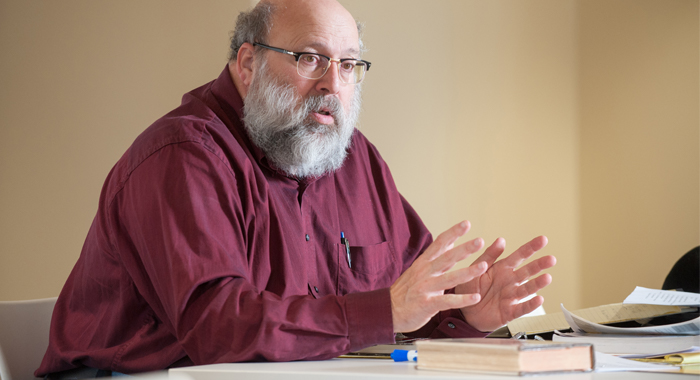Quiet Wisdom for a New Field
Amy Mrotek ’16, in the first semester of her post-graduation role as program manager at the Cassandra Voss Center, was assigned to serve as teaching assistant to Harry Brod while he was resident on campus. She reflects on what she learned from working alongside the distinguished visiting scholar.
Harry Brod is a quiet man.
He’s not the type you’d find stationed dead center of the room, firing off jokes or waving his arms in grandiose gestures. He’s not the professor who saunters into class Monday morning, recounting anecdotes from his weekend. He’s not even one to saunter – preferring instead to hang near the edge of a crowd, seated in a comfy chair, hands folded on his lap.
It’s not difficult to imagine a scholar of his standing acting the opposite. Indeed, when you’re considered a founding figure of an entire discipline (masculinities studies); when you’ve published numerous cross-disciplinary books in philosophy, sociology and Judaic studies; penned dozens upon dozens of academic articles and found time to be involved in some of the foremost social and political movements in contemporary American history; then you’d think you’d earned yourself a seat at the table – and a plush one, at that. Yet anyone who’s spent more than 10 minutes with Brod knows his wisdom lies in something more unique, more engrossing, more challenging: It’s in his silence. In saying less, he often says more than anyone else in the room.
Dr. Brod and I first met at the President’s Dinner, the annual welcome-back kickoff event held for all faculty and staff of the college. Brod and his partner, Karen Mitchell – herself a notable scholar in the fields of communications, speech and performance studies – were all seated together at the same table. One of the first group conversations to settle over the salad course centered on our origins – where our families lived, where we grew up. When the question came around to Brod, there was a moment of confusion. As he shared he was born in Berlin, a number of Wisconsinites at the table falsely, but humorously, attributed his hometown as New Berlin, Wis., not the capital of Germany. Brod was quick to laugh off the shortsighted geography. It led to conversation on beer and brats.
Though small, I often think of that night as the perfect sample of what Brod brings to a gathering – a dash of good-mannered musings, a world of knowledge (both literally and metaphorically). His Jewish roots mean cousins spanning as far away as Israel, and his lifelong political activism has taken him to cities and institutions around the globe. What you’re left with is the quiet contemplative – someone who’s seen and internalized pieces and pockets of the world, wishing to dust them off and put them back a little neater.
Even then, I could sense how deliberate of a thinker Brod was. That impression only grew over the course of his visiting semester. As a child of Holocaust survivors who came of age in the 1960s, he is a medley of social consciousness, sharp yet humble, restrained yet active. He approaches injustices, intolerance and conflict with an earnest calm, learned – or, perhaps, unlearned – over a lifetime. Recognizing where his voice serves best, he’s adopted the tactic of “listening people into change” – the concept that you can talk at a crowd or individual all day long, using all the persuasive tactics and rhetoric tricks in the book to make them see an issue in new light. But in doing so, you’ve missed the entire point. You’ve refused to recognize what their perspective offers, what their experiences imprint. You’ve treated them without dignity, and they’ll treat you accordingly.
Listening into change takes the opposite approach, almost Socratic in method. It instills that instead, when finding yourself in disagreements or tense conflicts, your role is to ask questions, to peel back layers. You dig to the root of the disagreement and its underlying causes. You don’t accuse, you don’t presume. You simply listen. That act of empathy and presence takes care of the rest.
Try that next time you fight with your spouse over leaving the toilet seat up.
This sense of attentiveness brought to every moment – the patience and the interest – came to personify the college’s first-ever distinguished visiting scholar. I wasn’t alone in taking note. It’s an underrated quality not just in academia, but in every corner of life. Yet we know it when we encounter it. People who listen not to respond – not to steer or hijack the conversation – provide a breath of fresh air amidst hours of noise. They’re as grounding as they are real, and we’re drawn in for warmth.
Working with Dr. Brod both as the Cassandra Voss Center’s program manager and his teaching assistant (and occasional computer troubleshooter) meant planning his on-and-off campus lectures, workshops and presentations. But it also meant witnessing him outside the typical academic walls. And that’s where the best lessons are learned.
Maybe the saying’s right after all. It’s the quiet ones to look out for.
March 17, 2017












